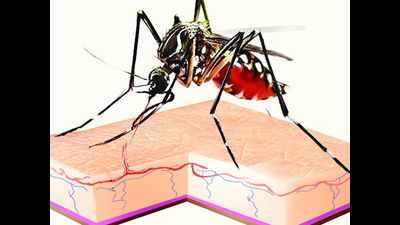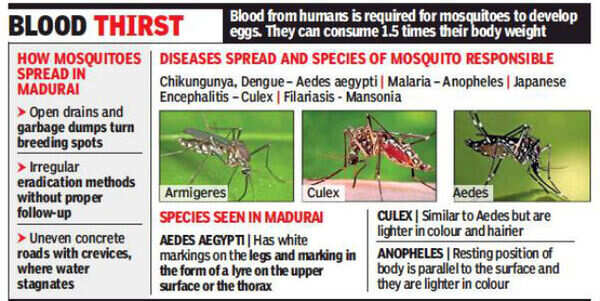- News
- City News
- madurai News
- 'Mosquitoes suck 100 litres blood daily in Madurai city'
Trending
This story is from March 10, 2019
'Mosquitoes suck 100 litres blood daily in Madurai city'

Representative image
MADURAI: Madurai is home to about 40 species of mosquitoes which have adapted to all climatic conditions, and worse, they suck about 100 litres a day from city residents. The stinging claims were made at a national conference on “Emerging Trends in Entomology” held at the American College recently.
Former head of the department of zoology at the college, Dr R Selvaraj Pandian, pointed out that urbanisation had resulted in mosquitoes, which were earlier confined to the cooler rural climes, migrating to the cities.Dr Pandian has worked on mosquitoes for over 30 years and guided nine PhD scholars. He said that the mosquitoes seen in Madurai belonged to five genera — aedes, armigeres, anopheles, culex and mansonia.

Some species were found in larger numbers in some parts of the city. For instance, five species of aedes were seen in South Gate and central parts of the city. Mosquitoes have shown greater adaptability and the expansion of the city had resulted in the species seen in the villages entering the urban parts. While it is conceived that aedes breeds only in clean water stored in containers, he said that he had observed the insects breeding in clean water stagnating on uneven roads in Nagamalai Pudukottai.
Dr Pandian said that at many places like Melavasal, Kuruvikkaran Salai and Narimedu, people slept in the open and were bitten more. According to him, they had recorded about 1,000 mosquitoes biting a person a day about a decade ago at these places. In some other parts, a person experienced about 100 bites per day. M Rajesh, assistant professor of Zoology, American College, said, ``Mosquito breeding is enhanced in drains when plastics clog them and prevent water flow. The menace can be controlled with a cleaner environment.” However, district malaria officer Dr John Victor contested the claims on the bites. ``To say that mosquitoes in Madurai consumed 100 litres of blood a day is hypothetical” . Many mosquito-borne diseases have come down in Madurai and what is required is public participation to control the menace. ``Lot of awareness is created but people do not act on what is disseminated to them through awareness programmes,’’ he said.
Read this story in Marathi
Former head of the department of zoology at the college, Dr R Selvaraj Pandian, pointed out that urbanisation had resulted in mosquitoes, which were earlier confined to the cooler rural climes, migrating to the cities.Dr Pandian has worked on mosquitoes for over 30 years and guided nine PhD scholars. He said that the mosquitoes seen in Madurai belonged to five genera — aedes, armigeres, anopheles, culex and mansonia.

Some species were found in larger numbers in some parts of the city. For instance, five species of aedes were seen in South Gate and central parts of the city. Mosquitoes have shown greater adaptability and the expansion of the city had resulted in the species seen in the villages entering the urban parts. While it is conceived that aedes breeds only in clean water stored in containers, he said that he had observed the insects breeding in clean water stagnating on uneven roads in Nagamalai Pudukottai.
Transport had resulted in mosquitoes spreading from place to place. As they could go without food for 10 days at a stretch, they could be transported by humans on cars, buses and trains. Once they came to a place, they started breeding and expanding their population. Mansonia was a mosquito which usually bred in aquatic plants and were rural-oriented. With the introduction of newage gardening and plants being grown in artificial ponds in parks and big buildings, they had started breeding in the city. The life cycle of a mosquito from egg to adult might vary from seven to 15 days. An adult could live from six months to a year, when conditions were conducive, he said. Blood meals from biting humans were required for mosquitoes to develop their eggs. They could consume about one-and-a-half times their body weight of blood. But blood was consumed only to reproduce, otherwise they fed on plant juice. They were also known to feed on sugar juices.
Dr Pandian said that at many places like Melavasal, Kuruvikkaran Salai and Narimedu, people slept in the open and were bitten more. According to him, they had recorded about 1,000 mosquitoes biting a person a day about a decade ago at these places. In some other parts, a person experienced about 100 bites per day. M Rajesh, assistant professor of Zoology, American College, said, ``Mosquito breeding is enhanced in drains when plastics clog them and prevent water flow. The menace can be controlled with a cleaner environment.” However, district malaria officer Dr John Victor contested the claims on the bites. ``To say that mosquitoes in Madurai consumed 100 litres of blood a day is hypothetical” . Many mosquito-borne diseases have come down in Madurai and what is required is public participation to control the menace. ``Lot of awareness is created but people do not act on what is disseminated to them through awareness programmes,’’ he said.
Read this story in Marathi
End of Article
FOLLOW US ON SOCIAL MEDIA










